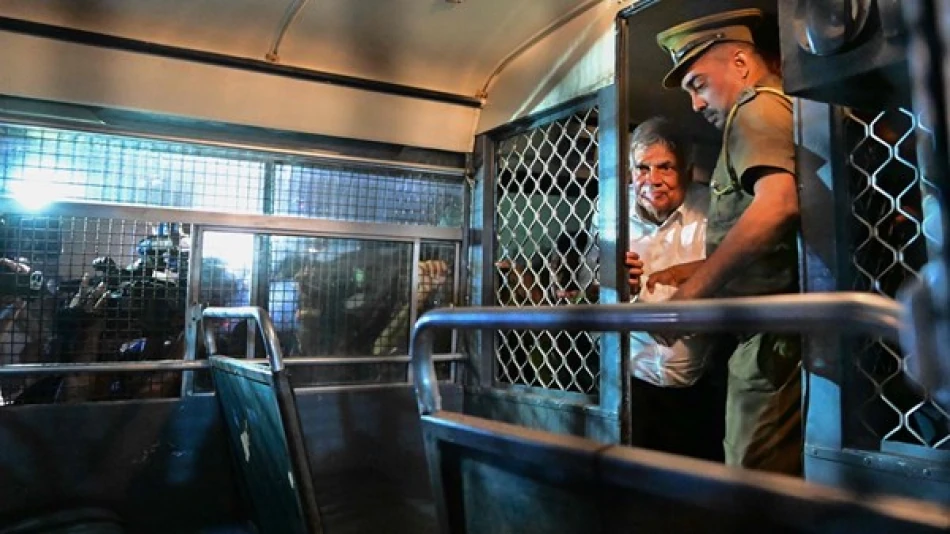
Former Sri Lankan President Arrested: A Dramatic Turn of Events
Sri Lanka's Former President Wickremesinghe Arrested in Anti-Corruption Crackdown
Former Sri Lankan President Ranil Wickremesinghe was ordered into custody Friday on charges of misappropriating public funds during a 2023 trip to London, marking the most high-profile arrest in the new leftist government's sweeping anti-corruption campaign. The detention of the 76-year-old veteran politician signals a dramatic shift in Sri Lanka's political landscape as President Anura Kumara Dissanayake follows through on campaign promises to tackle systemic corruption.
The Charges: A London Stopover Under Scrutiny
Wickremesinghe faces allegations stemming from a September 2023 visit to London, where he attended a ceremony at the University of Wolverhampton honoring his wife Maithree with an honorary professorship. The trip occurred during a stopover on his return from the G77 summit in Havana.
The Criminal Investigation Department alleges that Wickremesinghe used public funds to cover travel expenses for what was essentially a private visit, including costs for his personal security detail. While Wickremesinghe maintains his wife paid for her own travel expenses and no public money was misused, investigators argue the trip's personal nature invalidated the use of state resources.
A Colombo Fort Magistrate ordered Wickremesinghe held until Tuesday, when another hearing will examine the charges in detail. Police had previously questioned three of his senior aides in August as part of the investigation.
Political Context: From Crisis Manager to Opposition Target
Wickremesinghe's arrest carries particular irony given his role as Sri Lanka's economic stabilizer during its worst financial crisis. He assumed the presidency in July 2022 after Gotabaya Rajapaksa resigned amid massive public protests that brought the country to a standstill.
During his tenure, Wickremesinghe secured a crucial $2.9 billion IMF bailout package in early 2023 and implemented harsh austerity measures—doubling taxes and eliminating energy subsidies—that helped stabilize the economy. These unpopular but necessary reforms likely contributed to his electoral defeat to Dissanayake in September 2024.
The New Government's Anti-Corruption Drive
Dissanayake's administration has made anti-corruption enforcement a cornerstone policy since taking office. Wickremesinghe represents the most prominent opposition figure targeted in this campaign, suggesting the new government intends to pursue accountability regardless of political stature or past economic achievements.
This approach mirrors anti-corruption drives seen across South Asia, where new governments often target predecessors to demonstrate clean governance credentials. However, the timing raises questions about whether this represents genuine reform or political retribution against the architect of unpopular austerity measures.
Implications for Sri Lankan Politics
The arrest sends a clear message about the new administration's priorities, but it also risks undermining continuity in economic policy. Wickremesinghe's IMF program and structural reforms, while politically costly, were widely credited by international observers as necessary steps toward recovery.
For investors and international partners, the key concern will be whether the anti-corruption campaign enhances governance standards or creates political instability that could jeopardize ongoing economic recovery efforts. The IMF program remains crucial for Sri Lanka's financial stability, and any policy reversals could spook international creditors.
The case also highlights the precarious position of political leaders who implement necessary but unpopular reforms during crisis periods. Wickremesinghe's experience may serve as a cautionary tale for future leaders facing similar economic emergencies, potentially creating incentives to avoid tough decisions that could later be scrutinized through a political lens.
As Sri Lanka continues its recovery from the 2022 crisis, the balance between accountability and stability will prove crucial for maintaining both domestic legitimacy and international confidence in the island nation's democratic institutions.
Most Viewed News

 Layla Al Mansoori
Layla Al Mansoori






